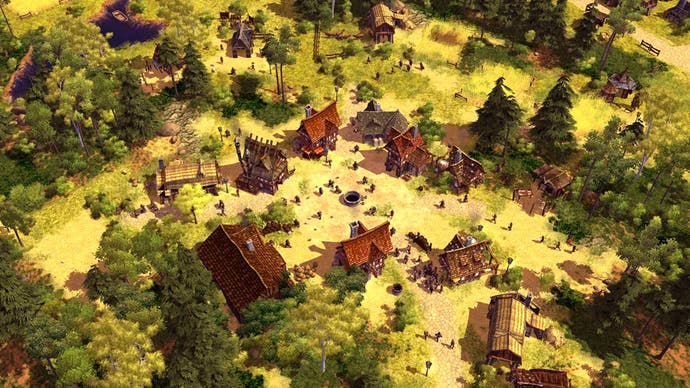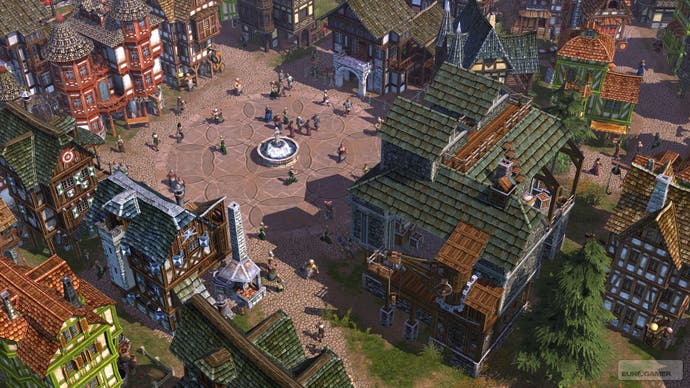The Settlers: Rise of an Empire
Fall of a franchise.
The Settlers has always been a curious beast. It first arrived in 1993, slap bang in the middle of the whole God Game/Real Time Strategy upheaval. Populous and Sim City had set the stage, Dune II had arrived just one year before and Command & Conquer was only a few years away. With two distinct strategy camps emerging, was The Settlers a city-builder or a real-time wargame? To begin with, it was very clearly a city builder with a rather sweet emphasis on the nerdy intricacies of trade routes. But as the years and sequels went by the game became more and more muddled, with more and more RTS trimmings, until it was pretty apparent that even Blue Byte didn't know what The Settlers was supposed to be any more.
This identity crisis culminated in 2005's Heritage of Kings, a combat-skewed game with hero units and lumbering resource grinding that was virtually unrecognisable as a Settlers title. Fans gnashed their teeth and tried to think nice thoughts about the good old days. So does Rise of an Empire, the sixth official Settlers game not counting the recent Settlers II remake, finally restore the tarnished series to its former glory?
Sadly not.
It's not for want of trying though. There's clearly been an attempt to reconnect with what made the series so special, though this well-meaning scramble for credibility is undermined by some awkward design decisions and programming gaffes. When a game has to download a 100Mb patch to fix some pretty major issues so soon after going on sale, and yet still can't guarantee that all the menu selections will actually work first time, we're clearly not talking about a game that has benefited from state of the art coding techniques. Taken alongside the unplayable bug-riddled DS version, Blue Byte seems more than a little out of its depth trying to keep its flagship series in line with the demands of modern gaming.

The uninspired single player campaign casts you as a king trying to unite the shattered Darion empire across a series of objective-based missions. Aiding you in your quests, and acting as your emissaries on the ground, are a group of knights. Each comes with specific effects - Marcus makes it cheaper to recruit soldiers, for instance, while ex-mercenary Kestral boosts your tax income without annoying the populace - and you can choose a different knight at the start of each mission depending on what you think lies ahead. In tangible gameplay terms, the choice is negligible. You're never going to flunk a level because you chose poorly, and it soon boils down to a pragmatic choice between the few knights that make, or save, money. As you hit pre-defined progress markers, you're able to promote your knights to things like Baron or Marquis, which in turn unlocks more features and construction options.
But every mission begins with just the basics of a settlement - a crumbling castle, a storehouse and a cathedral. Maps are divided into separate territories, with resources like wild game, stone quarries and iron mines clearly marked whenever you explore a new area. These bits will be most familiar to Settlers fans and, to begin with, it's easy to feel your fondness for the series being rekindled. The graphics are cute without being too whimsical and, as always, there's a real joy in seeing your small town take shape.

However, it doesn't take long to realise that the game has been simplified to an almost insulting degree. If anything, your Settlers are almost too smart now, and seem to require little from you other than basic construction work. Provided you place the appropriate building within reasonable distance of its related resources, they'll set to work harvesting and delivering to the storehouse. The tradesmen who use the resources also require little assistance, automatically collecting and using logs, meat, wool, whatever they need. And then the finished goods are promptly returned to the storehouse and distributed around town without you even needing to click anything. If your knight enters a friendly town, trade begins without any negotiation or input from the player. In automating so many of the areas that were the core of the first games, you get a game where the better you play, the less you actually have to do.








